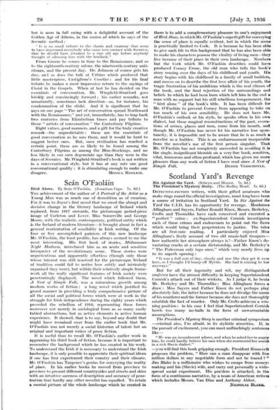Sean O'Faolain
Bird Alone. By Sean O'Faolain. (Jonathan Cape. 7s. 6d.) THE achievement of the author of A Portrait of the Artist as a Young Man was as much one of demolition as of creation. For it was to Joyce's first novel that we owed the abrupt and decisive change in the literary landscape of Ireland which replaced, from 1917 onwards, the picturesque period-piece image of Carleton and Lever, Miss Somerville and George Moore, with the realistic, contemporary, political entity which is the Ireland of modem literature—it brought about in fact a general reorientation of sensibility in Irish writing. Of the four or five accomplished painters of this new landscape Mr. O'Faollin, the least prolific, has always seemed to me the most interesting. His first book of stories, Midsummer Night Madness, introduced him as an acute and sensitive interpreter of the revolutionary scene. These stories were unpretentious and apparently effortless (though only those whose interest was still reserved for the picturesque Ireland of tradition could fail to notice how subtly and intricately organised they were), but within their relatively simple frame- work all the really significant features of Irish society were penetratingly displayed. The novel which followed them, A Nest of Simple Folk, was a miraculous growth among modern works of fiction ; a long novel which justified its grand manner in providing a truly comprehensive picture of all the social and political forces which were at work in the struggle for Irish independence during the eighty years which preceded the rebellion of 1916, representing these forces moreover not merely in sociological form as so many easily tabled abstractions, but as active elements in active human experience. It showed, that is to say, beyond any doubt that Might have remained -over from the earlier book that Mr. O'Faolain was not merely a social historian of talent but an original and important writer of prose fiction.
It is useful thus to recall Mr. O'Faolain's earlier work in appraising his third book of fiction, because it is important to remember the background which he has created in his -work. To understand the Irish it is necessary to understand the Irish landscape, it is only possible to appreciate their spiritual idiom if one has first experienced their country and their climate. Mr. O'Faolain has Turgenev's genius for conveying the reality of place. In his earlier books he moved from province to province to present different countrysides and streets and skies with an intuitive sureness of description and accuracy of pene- tration that hardly any other novelist has equalled. To retain a mental picture of the whole landscape which he created in them is to add a complementary pleasure to one's enjoyment of Bird Alone, in whichMr. O'Faolain's superb gift for conveying the sense of place is equally evident, but in which the scene is practically limited to Cork. It is because he has been able to give such life to this background that he has also been able to make his characters possess the vitality of living men—they live because of their place in their own landscape. Nowhere but the Cork which Mr. O'Faolain describes could have produced Corney Crone, the old- man who tells the book's story musing over the days of his childhood and youth. His story begins with his childhood in a family of small builders, and moves on to describe the first love affair of his youth, the tragic frustration of his ambitions which is the real climax of the book, and the final rejection of the surroundings and beliefs to which he had been born which left him in the end a man with no support but his still rebellious temperament, the " bird alone " of the book's title. It has been difficult for Mr. O'Faolain to prevent Corney from appearing to take on too much, of his own sensibility. He does not have Mr. O'Faolain's outlook or his style, he speaks often in his own dialect, but these magical reconstructions of the past, evoea- - tions of scenes, places and men, come from his mouth, and though Mr. O'Faolain has never let his narrative lose spon- taneity, it is impossible not to be aware that he is as much a novelist as a builder. This is an embarrassment inseparable from the novelist's use of the first person singular. That Mr. O'Faolain has not completely succeeded in avoiding it is the single, insignificant blemish on a very fine book, sensitive, vital, humorous and often profound, which has given me more pleasure than any work of fiction I have read since A Nest of














































 Previous page
Previous page